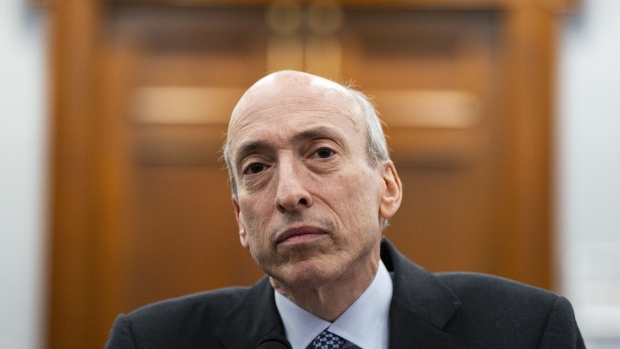Jun 7, 2023
Wall Street Faces Fresh Fight With SEC’s Gensler Over European Securities Rules
, Bloomberg News

(Bloomberg) -- Wall Street is headed for a fresh regulatory battle over how clients pay for investment research when a hard-fought reprieve from Europe’s tough MiFID II rules expires next month.
American securities firms shouldn’t count on the Securities and Exchange Commission extending temporary relief it previously granted to blunt the impact from European Union regulations, agency Chair Gary Gensler said Wednesday. The EU rules require that brokers charge clients separately for their analysis on stocks and bonds, a setup that industry executives warned would trigger fresh compliance costs in the US.
In the US, brokers generally can’t sell research without first registering as investment advisers and meeting additional investor-protection requirements. After a fierce lobbying campaign, the SEC gave brokerages relief in 2017 through what’s known as a no-action letter, a notice that amounts to a regulatory free pass. The reprieve, which was extended for three years in 2019, is now due to expire in early July.
“The staff shared with the markets last fall that that’s going to expire and that’s what they should anticipate,” Gensler told reporters in response to a question about the looming expiration.
There are signs that US brokerages have already adjusted their business models. Most notably, banks have started allowing American clients to buy research without paying a steep price for trading services. In its 2019 extension, the regulator clarified its position in a way that affirmed brokerages have a green light to sell analysis in the US through a long-standing workaround.
However, the clock is ticking and, with no extension in the offing, the industry is already pushing back.
Failure to extend the relief “would result in permanently foisting a foreign law, soon to be dramatically changed, on the U.S. market,” said Kenneth Bentsen Jr., chief executive officer of the Securities Industry and Financial Markets Association, a trade group representing broker-dealers that pushed for the original relief.
The SEC’s plan “of having broker-dealers run sales and trading research though a registered investment adviser” won’t solve the conflicting laws between the two jurisdictions, he said in a statement to Bloomberg News after Gensler’s comments.
The US Congress has started to re-examine the issue, with the House Financial Services Committee approving a bipartisan bill May 24 to extend the SEC’s no-action relief for another six months. However, the legislation is unlikely to make it through Congress before the current deadline expires. Separately, the EU is considering plans to ease some of the MiFID II requirements to make it easier for smaller research firms to combine trading execution and research fees.
©2023 Bloomberg L.P.






